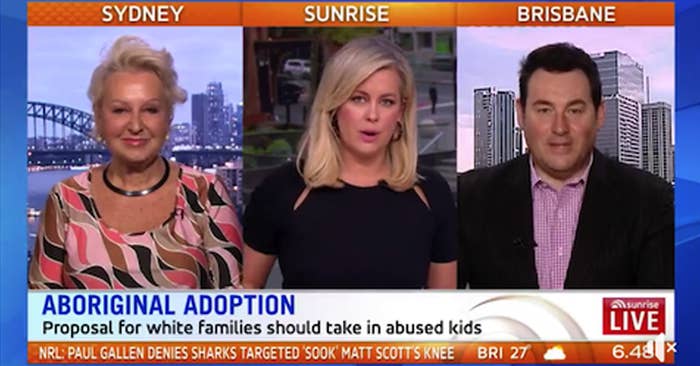
Channel Seven has failed in its bid to strike out a lawsuit brought by a group of Aboriginal people who say they were defamed during a now infamous panel discussion on breakfast TV show Sunrise about adopting Indigenous children.
Yolngu woman Kathy Mununggurr and 14 others from the remote community of Yirrkala, including adults and children, are suing the TV network after they were depicted in blurred overlay footage that played during the segment in March 2018.
In the discussion, hosted by Samantha Armytage, commentator Prue MacSween said of the Stolen Generations that “we need to do it again, perhaps”, and Ben Davis, a radio host at the time, said Aboriginal kids are getting “abused” and “damaged”.
The comments made by the all-white panel provoked protests outside the Sunrise studio in Sydney's CBD.
Mununggurr and the adults suing argue they were identifiable in the footage and that by playing it during the discussion Sunrise had suggested they abused, assaulted or neglected children, were incapable of protecting their children, and were members of a dysfunctional community.
The children suing say the program defamed them by suggesting they had been raped and assaulted, and were so vulnerable to danger that they should be removed from their families.
The group is also suing for breach of confidence and breach of privacy, as well as misleading and deceptive conduct and unconscionable conduct under Australian consumer law.
The TV network tried to strike out all aspects of the lawsuit in a Federal Court hearing on Wednesday afternoon, but failed after Justice Steven Rares said all the issues could and should be argued at trial.
Seven’s barrister Kieran Smark SC argued that it was not defamatory to suggest somebody was a victim of abuse, because it would not cause that person to be shunned or avoided, or have others cast moral aspersions on them.
This problem “underpins the whole" of the defamation case brought by the children, Smark said.
He said that far from causing somebody to be shunned, an ordinary reasonable person — the test in a defamation case — would have "a straightforward reaction, which is a reaction of sympathy" to somebody who had been abused.
Rares disagreed, saying he was not so sure the community had "as sympathetic and pure a view of mental trauma" as Smark suggested.
The judge noted Australia's high Aboriginal incarceration rates, and said that many people who end up in prison experience trauma in their childhood.
"Here you’ve got a group of people who could be looked at by the ordinary reasonable person as 'that’s the start of that, they’re on the way to trouble for the rest of their lives'," he said. "It might not be as sympathetic as you say."
Smark suggested that judges and other people working in the justice system might employ that reasoning, but that the "person in the street" would feel "horror at the allegation, sympathy to the victim, but not take the next step and say, 'well I wouldn’t want to go near the person'."
Rares ultimately disagreed, saying it was "quite arguable" that a person might, by no fault of their own, be viewed as "damaged goods" and "seen as a problem in life because they have been abused".
He declined to strike out the claim and told Smark that at trial he would decide "whether the ordinary reasonable person is as nice as you would have me believe or less nice".
Smark also argued for the claim to be struck out on the basis that the people in the footage could not be identified, but the argument was quickly rejected by Rares.
"This is about an Aboriginal community. They’re all very close. The neighbours know each other, they all know each other," the judge said.
"You’ve got a whole community up there, most of whom will be able to recognise each other, obviously some of whom who watch Sunrise, or whatever the show is called."
The lawyers spent a lengthy period arguing whether the claim for misleading and deceptive conduct should be struck out.
Smark said Channel Seven had an exemption from such a claim as an "information provider" under the legislation, and that suing for defamation or complaining to the Australian Communications and Media Authority was a more appropriate path.
"When people sue the media for this sort of thing they’ve got their rights, but their rights are not for misleading and deceptive conduct," he said.
Barrister Therese Catanzariti, acting for Mununggurr and the others, argued the exemption did not apply because of the commercial interests at play in the segment.
Davis and MacSween were there being promoted in their respective roles as a radio host (Davis) and as a commentator who worked at a PR agency (MacSween), she argued.
Rares accepted there was an argument that Davis and the radio station 4BC were being promoted during the segment, but was less convinced when it came to MacSween.
“To me she’s a nobody. I’ve never heard of her and I’ve got no idea what contribution she possibly could have made to the program,” he said.
Nonetheless Rares sided with Catanzariti and declined to strike out the claim.
Seven's attempts to strike out the remaining claims of breach of confidence, breach of privacy and unconscionable conduct were similarly rejected.
Seven was ordered to pay the costs of the hearing.
